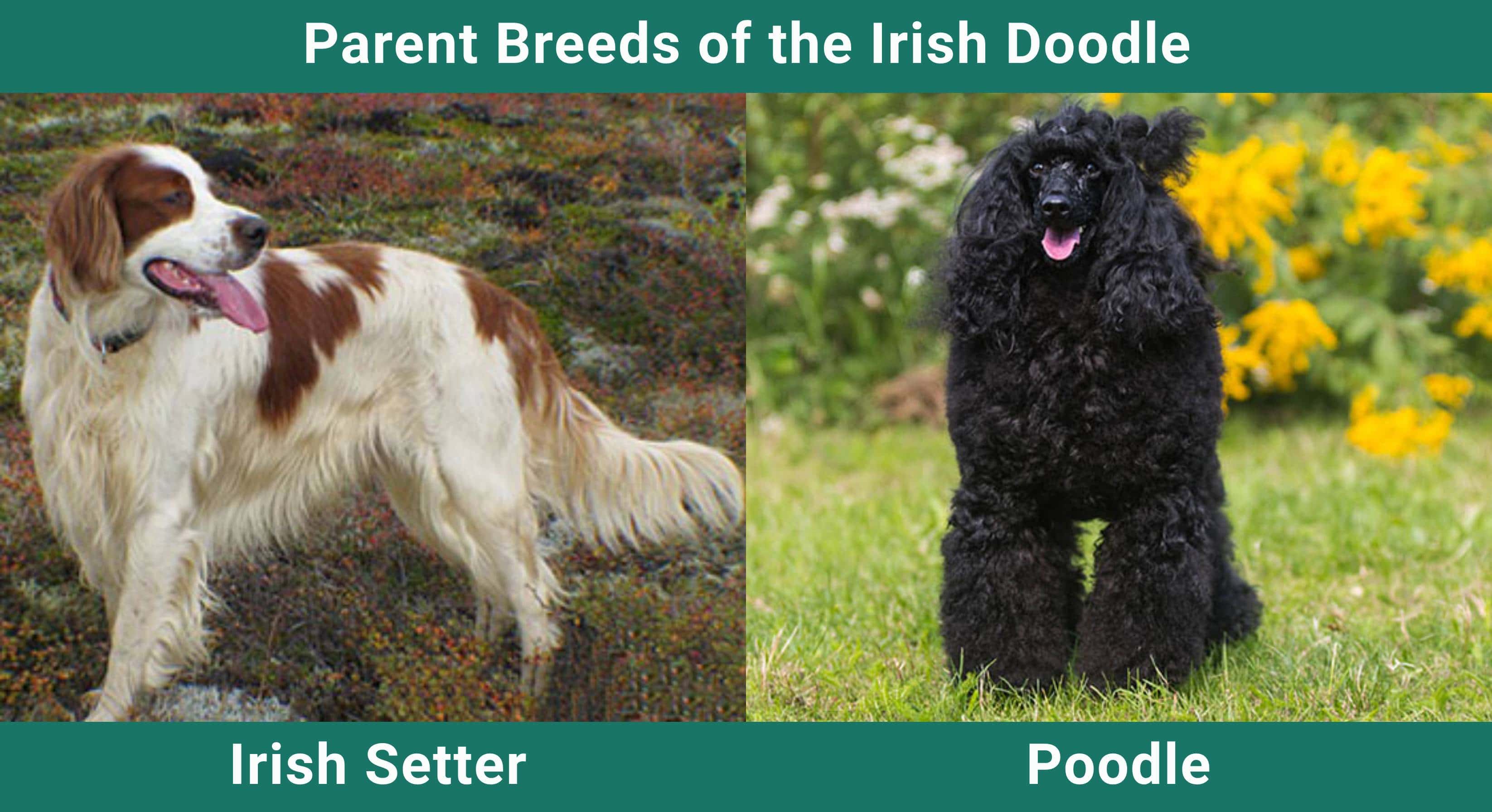Click Below to Skip Ahead
The Irish Doodle is a beautiful hybrid breed that can bring joy to the hearts of children and adults alike. With Irish Setter and Poodle parents, this dog is outgoing, friendly, playful, and full of curiosity. Their smarts make them easy to work with when it comes to obedience and agility training.
Breed Overview
Height:
24–26 inches
Weight:
40–65 pounds
Lifespan:
10–15 years
Colors:
Red, black, apricot
Suitable for:
Families and singles, apartment and house settings, multi-animal households
Temperament:
Friendly, active, intelligent, good with kids
This mixed breed doesn’t need much exercise, nor do they mind spending time at home alone, making them a great pet option for households with busy schedules. However, these dogs love spending time with humans, so they do expect to get plenty of attention from their household members every day.
Irish Doodle Puppies

It is important to learn all that you can about the Irish Doodle before deciding whether to adopt one, as this may not be the right breed for your household. This energetic and loving dog loves to play with people, especially kids. They are easy to train and are highly sociable.
Irish Doodles are generally healthy, but they can be susceptible to a couple of health problems. With good care, a healthy diet, and exercise, though, your dog should be healthy and happy. Bringing home an Irish Doodle will be a fun and playful experience!

Temperament & Intelligence of the Irish Doodle
Irish Doodles are active but do not require hours of exercise every day to stay happy and healthy. They have a sensitive side that makes them crave the attention and approval of their human counterparts.
Once a new skill, task, trick, or habit is learned, it is tough to get this mixed breed to unlearn it. Therefore, it is important to offer positive reinforcement when they do the right things and redirection when unwanted actions take place. They thrive with obedience training in place, and they have no problem hanging out with other dogs.
Are These Dogs Good for Families? 👪
Irish Doodles are fun-loving, intelligent dogs that take well to training and love spending time with human companions, especially children.
Does This Breed Get Along With Other Pets? 🐶 😽
With a curious nature and penchant to play, the Irish Doodle typically accepts dog friends of all types, small and large, as time goes on. However, if this breed grows up isolated from other canines, they may feel threatened when confronted with another dog during adulthood. Therefore, it is pertinent to introduce obedience training and ensure socialization with other dogs during puppyhood. This hybrid breed can also get along with cats and other pets if they are introduced early on and trained not to chase or hunt at a young age.
Things to Know When Owning an Irish Doodle
There are many things that you should learn about the Irish Doodle before deciding to adopt one. Find out everything from food and water requirements to exercise preferences and training abilities here!
Food & Diet Requirements 🦴
The average Irish Doodle can eat anywhere from 2 to 4 cups of commercial dry food (or the equivalent of wet or homemade food) each day. Most owners find that two to three meals a day are best for digestion and performance. Commercial dog food should include real protein in the form of chicken, beef, turkey, or fish as the first ingredient.
Whole grains, such as quinoa, brown rice, and oats, should also be included, as should fresh fruits and veggies, including berries, bananas, cranberries, greens, squash, corn, and sprouts. Any wet or homemade food should include all the features laid out here for commercial dry food. Owners should consult a veterinarian if in doubt about their Irish Doodle’s nutritional needs.
Exercise 🐕
Irish Doodles are active and love to run and play. However, they do not require hours of work or physical interaction every day to stay healthy as they age. What each Irish Doodle does require is a brisk, 5–20-minute walk around the neighborhood or apartment community each day. They will never turn down a game of fetch in the yard, and they will not hesitate to play a game of tug-of-war with another dog or a child companion in the house during evening hours.
However, owners can also expect their Irish Doodle to spend a great deal of time cuddling, hanging around, and lying near laps whenever possible. These dogs are chill when everyone else is and excited when the social situation calls for it, as long as they get a quick daily walk and regular interactive attention.
Training 🎾
The intelligence and eagerness to please that most Irish Doodles exhibit make them awesome animals to work with when it comes to training. These dogs can easily learn the basics, including come, sit, and stay. They can also learn advanced skills, such as fetching the remote control and properly greeting visitors at the door.
These dogs can learn agility training and excel in competitions due to the smarts of their Poodle side and the agility of their Irish Setter side. Hunting training is possible, but owners should not expect this mixed breed to become a superb hunter for commercial reasons.
Grooming ✂️
Irish Doodles typically shed frequently, no matter what time of year it is. Combing or brushing three to five times a week is necessary to keep shedding under control. Summer months may require up to 5 days of grooming to minimize shedding throughout the house. These dogs may require nail trimming once a month or so if they do not get out to walk on the ground at least five times a week.
Ears should be checked and wiped clean with a damp rag or cotton swabs regularly. Some Irish Setters are semi-hypoallergenic if their coats are inherited from their Poodle parents. However, potential owners should assume that their Irish Doodle is not hypoallergenic and should make ownership decisions accordingly.
Health and Conditions 🏥
Owners can expect their Irish Doodles to remain generally healthy when proper care, food, and exercise are in place. However, there are certain health conditions they can become susceptible to that are worth knowing about.
- Bloating
- Skin diseases
- Hip dysplasia
- Eye disorders
- Epilepsy
- Color dilution alopecia
Male vs. Female
Both male and female Irish Doodles are loving, interactive, and loyal. The sexes may differ in the training and independence departments, but the differences are typically subtle. For example, a male may be more independent at home, while a female is more attentive on the agility course. However, both sexes can handle being alone at home and do excellently during agility drills.
3 Little-Known Facts About the Irish Doodle
1. They Have Multiple Nicknames
These dogs go by many different names, depending on who is talking about them. Some people call them Irish Doodle, while others prefer the term Irish Setterpoo. Irish Poo Setter, Irish Setterdoodle, and Irish Doodle Setter are other popular nicknames for this designer dog.
2. They Rarely Bark
Although the Irish Doodle typically inherits the intelligence of their Poodle parent and the hunting instincts of their Irish Setter parent, they do not make for a good watchdog because they rarely bark. This breed does not spend time looking out for strangers through the window or barking at kids playing in the yard. Instead, they prefer to focus on household members and leave the watching and barking to other dogs.
3. Their Coat Can Be High Maintenance
Due to the Irish Doodle’s wavy thick hair, they tend to shed frequently throughout the year. Therefore, it is important to make sure that they are brushed or combed several times a week unless having dog hair on furniture, clothes, and the car is not a worry.
Final Thoughts
Are you interested in adopting an Irish Doodle? If so, what about this hybrid dog excites you the most? We love that these dogs are outgoing, friendly, loyal, and loving to children. However, they do require a serious commitment and plenty of space to stretch out, interact with others, and enjoy life overall. Always spend time considering dog ownership and weighing the pros and cons before making a final adoption decision.
Related Read:
Featured Image Credit by: Joca de Jong, Shutterstock










